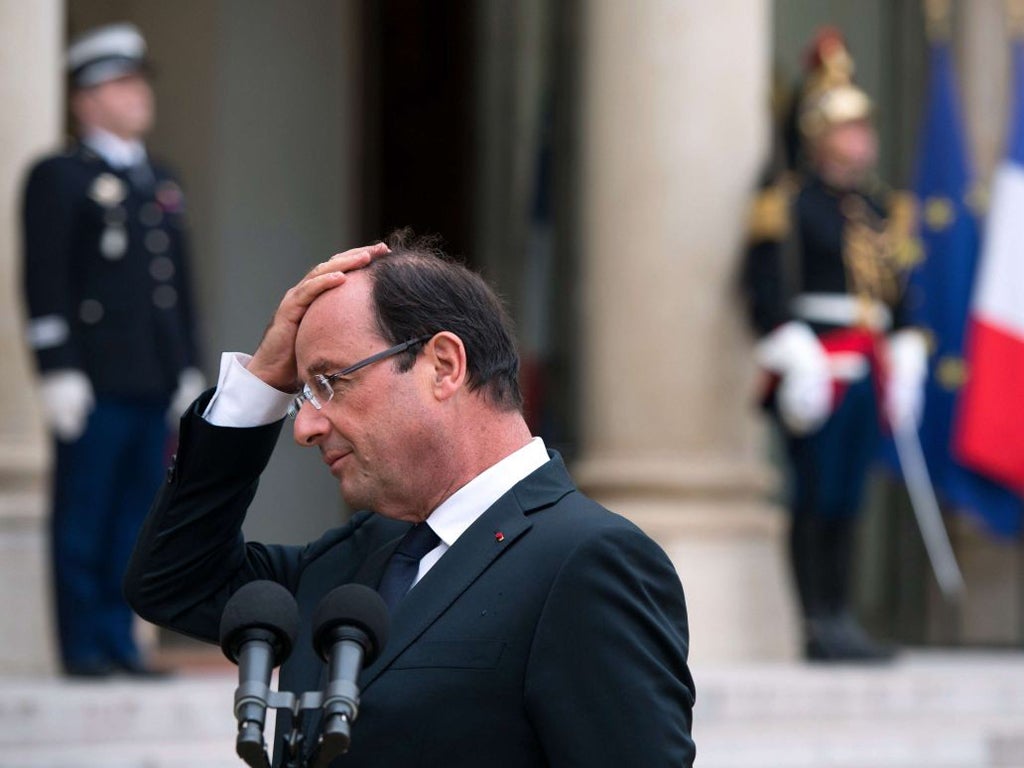Give me time, begs Hollande as his popularity plummets

Your support helps us to tell the story
From reproductive rights to climate change to Big Tech, The Independent is on the ground when the story is developing. Whether it's investigating the financials of Elon Musk's pro-Trump PAC or producing our latest documentary, 'The A Word', which shines a light on the American women fighting for reproductive rights, we know how important it is to parse out the facts from the messaging.
At such a critical moment in US history, we need reporters on the ground. Your donation allows us to keep sending journalists to speak to both sides of the story.
The Independent is trusted by Americans across the entire political spectrum. And unlike many other quality news outlets, we choose not to lock Americans out of our reporting and analysis with paywalls. We believe quality journalism should be available to everyone, paid for by those who can afford it.
Your support makes all the difference.President François Hollande, facing an unprecedented meltdown in his popularity, today criticised the impatience of French voters but promised that his softly-softly approach would triumph in the end.
In an interview with Le Monde almost six months after his election, Mr Hollande insisted he had not been shocked by his precipitous fall in the opinion polls.
“To be in office today is very tough,” he said. “There is no indulgence and no respect. But I knew that already.”
In a new survey to be published by the market research firm Sofres tomorrow, Mr Hollande’s approval rating sinks to 37 per cent, compared to 62 per cent just after his election in early May. This is the steepest drop in popularity of any newly-elected head of state in 50 years.
Pollsters say the collapse is driven by a belief – on both the right and part of the left – that Mr Hollande has adopted too aloof and plodding an approach to France’s worst economic crisis since the war. There is also fury on the right at threatened tax rises and anger on the left at deficit cutting in the face of zero growth and 10 per cent unemployment.
In his interview, the President admitted he had been wrong to react against the frenetic approach of his predecessor Nicolas Sarkozy by reverting to the semi-detached style of previous presidents.
He had now “adjusted” to a more hands-on approach.
But Mr Hollande reminded voters that they detested what was widely seen as Mr Sarkozy’s confrontational and divisive attitude to social and economic reform.
“In France, I believe, the changes we need have to be led by the left, through negotiation, with fairness and without injuring or insulting the weakest,” he said. “Other people would have done it more brutally.”
Exactly what economic reforms Mr Hollande and his government are planning remains unclear. A report, commissioned by the President on how to restore France’s international competitiveness is due next week.
It has already been largely shelved because it offended left-wing sensibilities by attacking the 35-hour working week and the high payroll taxes which fund healthcare and other social policies.
After initially talking of a “shock” to improve France’s ability to compete in European and world markets, Mr Hollande now speaks of a “pact”.
This non-confrontational approach – launching lengthy negotiations with employers and unions – should not be mistaken for inactivity, Mr Hollande said.
“It is easier to make a splash with quick decisions than with slow negotiations… But we will see what I have achieved at the end of five years.” There is increasing nervousness in Berlin that, despite Mr Hollande’s commitment to deficit cutting, the slow pace of French economic reform could provoke a new eurozone crisis in 2013.
These fears were voiced at a conference in Berlin this week not by Chancellor Angela Merkel, but by her Social Democratic predecessor, Gerhard Schröder.
“The greatest problems for Europe are Spain and Italy but also, and I say this discreetly, France,” Mr Schröder said. “And that would not be a minor problem.”
Mr Hollande said he believed French growth would revive, and unemployment start to fall, by the “second half of next year”.
“But there could also be the dark scenario of a recession,” he warned. “As head of state, I must prepare for all hypotheses”.
Join our commenting forum
Join thought-provoking conversations, follow other Independent readers and see their replies
Comments